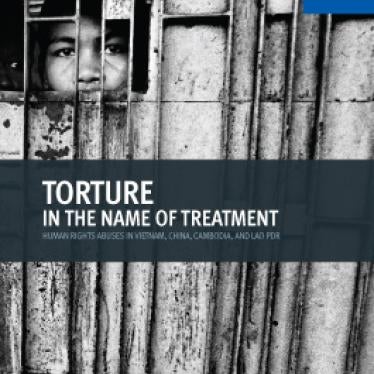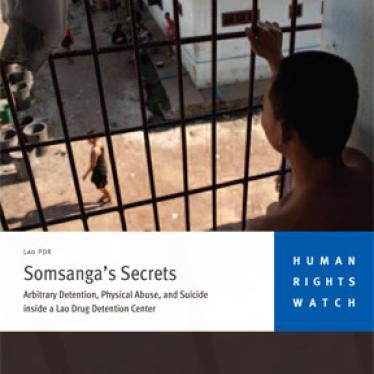The 23-page document, “Torture in the Name of Treatment: Human Rights Abuses in Vietnam, China, Cambodia, and Lao PDR,” summarizes research with individuals who had been detained in Vietnam, China, Cambodia, and Lao PDR. More than 350,000 people identified as drug users are detained in the name of “treatment” in these countries for periods of up to five years. In many centers, drug users are held alongside homeless people, people with psychosocial disabilities, and street children, and are forced to perform military drills, chant slogans, and work as “therapy.”
“There are proven ways to address drug dependency consistent with human rights, but beatings, forced labor, and humiliation are not among them,” said Joe Amon, director of the Health and Human Rights Division at Human Rights Watch. “These centers need to be closed, and voluntary, effective drug treatment provided in their place.” Individuals in drug detention centers in all four countries are commonly held against their will. They are picked up by police, or “volunteered” by local authorities or family members who buckle under social pressure to make their village “drug free.” Once inside, they cannot leave. No clinical evaluation of drug dependency is performed, resulting in the detention of occasional drug users as well as others merely suspected of using drugs.
International health and drug-control agencies, including the UN Office on Drugs and Crime, the Joint UN Programme on HIV/AIDS (UNAIDS), and the World Health Organization, recommend comprehensive, community-based harm reduction services, including evidence-based drug-dependence treatment and access to sterile syringes as essential to protect the health and human rights of people who use drugs. Drug detention centers that hold drug users for long periods of time without providing evidence-based treatment violate these standards and are widely believed to be ineffective. Research in China and Vietnam has found high rates of relapse among individuals held in drug detention centers, as well as increased risk of HIV infection from being detained.
Depending on the country, so-called treatment consists of a regime of military drills, forced labor, psychological and moral re-education, and shackling, caning, and beating. Human Rights Watch documented forced labor in detention centers in China, Vietnam, and Cambodia, though the nature and extent of forced labor varied within and between countries.
In Vietnam, “labor therapy” is stipulated as part of drug treatment by law, and drug detention centers are little more than forced labor camps where tens of thousands of detainees work six days a week processing cashews, sewing garments, or manufacturing other items. Refusing to work, or violating center rules, results in punishment that in some cases is torture. Quynh Luu, a former detainee who was caught trying to escape from one center, described his punishment: “First they beat my legs so that I couldn’t run off again... [Then] they shocked me with an electric baton [and] kept me in the punishment room for a month.”
Access to drug dependency treatment within the centers was either restricted to a small subset of the center’s population, who were also required to adhere to a rigid and punishing forced labor regimen, or nonexistent. Huong Son, who was detained for four years in a drug detention center in Vietnam, said, “No treatment for the disease of addiction was available there. Once a month or so we marched around for a couple of hours chanting slogans.”
Human Rights Watch also found evidence that children were detained in drug detention centers in Cambodia, Vietnam, and Lao PDR, and subjected to the same “treatments,” including forced labor, military exercises, and physical and sexual abuse.
“Drug detention centers jeopardize the health and human rights of detainees,” Amon said. “They are ineffective, abusive, and are detaining people in violation of international law.” Mandatory HIV testing was common in China’s drug treatment centers, but test results were not always disclosed to patients. A former detainee in Guangxi Province, China, said, “I was tested in detox twice for HIV but was never told the result. Then when I got out I was so sick that I went to the clinic. I was scared of getting arrested, but I have a son and I didn’t want to die. They tested me and told me I have AIDS.” Unprotected sex and unsafe drug use occur in the treatment centers, but condoms and safe injecting equipment are not available.
In March 2012, 12 United Nations agencies, including the UN Office on Drugs and Crime, the World Health Organization, the UN Children’s Fund (UNICEF), and UNAIDS, issued a joint statement calling for the closure of drug detention centers and the release of detained individuals “without delay.” But international donors continue to provide funding and other support to many centers, despite the human rights consequences. For example, in June the US Government pledged $400,000 to support the Lao National Commission for Drug Control and Supervision to “upgrade” facilities at a detention center which had been the focus of one Human Rights Watch report. Research in drug detention centers – such as a recently published study partially funded by the United States National Institute on Drug Abuse (NIDA) in two Chinese drug detention centers – often fails to acknowledge the legal context of individuals, and the conditions they face, inside the centers.
“Donors should recognize that they cannot credibly call for the immediate release of all individuals in drug detention centers while continuing to conduct research and provide support and assistance as if these are legitimate treatment centers,” Amon said. “Individuals in these centers are being held illegally, abused, and denied care.”
“If we opposed the staff they beat us with a one-meter, six-sided wooden truncheon. Detainees had the bones in their arms and legs broken. This was normal life inside.”
“They try to teach not to use drugs, that it isn’t good to use [drugs], while showing that normal people have a good future. I don’t think the classes helped me stop using drugs… Some people use more drugs when they come out of Somsanga.”
“There are lots of people and not enough food. It was hard to sleep there because in my room there were 60 people. There was not enough water for the showers, only a few minutes to shower every day.”
“I tried to run away, and in the process, I broke both feet. When I went to the hospital for treatment, I was arrested and sent back to the drug addiction center… Inside I was given very little food, and they never gave me any medicine at all to treat my feet. I was locked up for about half a year and my feet became crippled.”
“All drug detention is, is work. We get up at five in the morning to make shoes. We work all day and into the night. That’s all it is.”
“There were about seven children in my room but maybe about 100 children altogether. The youngest was about seven years old. The children are not drug users but homeless, like beggars on the street.”







